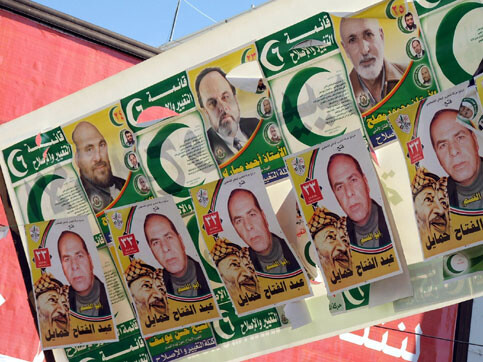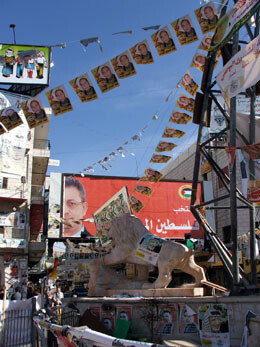The Electronic Intifada 23 January 2006

It’s neck and neck between Hamas and Fateh (Maureen Clare Murphy)
In just over 24 hours, Palestinians in the West Bank and Gaza Strip will elect their legislative council for the first time in ten years. The council itself a product of the 1993 Oslo Accords which created the Palestinian Authority government, major shifts in Palestinian politics have occurred in the last ten years with the collapse of those same accords.
Popular perceptions
Palestinians in the occupied territories are gripped to see who will enjoy the majority of the seats in the council — the ruling party Fateh or the Islamist opposition movement Hamas. Fateh has lost a great deal of support after ten years of failed negotiations with Israel, a drastic deterioration of the severe humanitarian situation endured by West Bank and Gaza Palestinians, and widespread corruption in the Palestinian Authority (PA) and failure to uphold the rule of law that has spilled out into the streets with sharpened lawlessness and vigilantism.
The latest opinion polls indicate that Hamas and Fateh are neck and neck in Gaza, where Hamas has claimed victory for the Israeli withdrawal that took place in August of last year. Impoverished Gazans are also tired of the rampant lawlessness plaguing their cities. Personal security is anything but secure in the Strip, which regularly produces reports of kidnappings, clan-related violence, and vigilantism.
Though Hamas has generally enjoyed a reputation for keeping its house in order — unlike the Fateh-ruled PA, notorious for cronyism and mass corruption — its campaign has raised more than a few eyebrows. There are rumors that they are using charity (Zakat) money to run part their campaign. And though it is illegal to campaign in schools and religious institutions under Palestinian election law, one doesn’t have to search far for a mosque covered in Hamas election posters.
And like Fateh, Hamas is being criticized for the massive amount of money they are spending on their campaign. Though the legal limit is 1,000,000 USD, the mass quantities of posters, banners, and flags that have mushroomed up in the territories, as well as the full-page color ads taken out in newspapers, the numerous radio and television spots, and other means of campaigning, make it clear that significant overspending is happening — and causing many to question whether parties are breaking another election law by taking money from sources outside of the occupied Palestinian territories.
But it is the “Third Way” party, whose most familiar face is Palestinian legislator Dr. Hanan Ashrawi, that is coming under the most fire for its spending. Though its national list is only expected to win at most one seat in the 122-member council (the legislative council is elected by both proportional and popular vote, so voters cast two ballots - for both individual local candidates and national lists), it is said to be spending the most. The same criticism goes for the “Independent” party headed by Dr. Mustapha Barghouthi, who was a candidate during last January’s presidential elections. Both are widely suspected to be taking money from “Western” sources. Their campaign spending practices were a central question during a press conference amongst representatives from each of the national lists televised live on Al-Jazeera Saturday night.
Though people might like the rights-based platform of Dr. Barghouthi’s Independent list, and those running with him, it is anticipated that his expensive one-man show will hurt him when it comes time to count the votes. And as Dr. Ashrawi’s list does not enjoy much popular support, and the other lists are too minor-league to make any big splash, the Popular Front for the Liberation of Palestine’s (PFLP) list may do well come election day. It has been the exception to the rampant campaign spending, its list members enjoy the respect of the community, and it woo Hamas-wary voters who are tired of Fateh.
An imperfect process

The amount of money candidates are spending for their campaigns are causing many to wonder whether money is coming from the outside (Maureen Clare Murphy)
East Jerusalem was illegally annexed by Israel after the 1967 War, when it occupied the city with the rest of the West Bank and Gaza Strip. Palestinian East Jerusalemites lead a tenuous existence, constantly under threat of losing their Israeli “residency” privileges. Israel disallows any Palestinian political activity there. And with a feeling of abandonment by the Palestinian Authority, voter apathy is widespread amongst East Jerusalemites. A low voter turnout there will certainly tarnish the elections results.
Israel has made it clear that it is not pleased with Hamas contending in the elections (Hamas boycotted the last legislative lections in 1996 and last year’s presidential elections as it doesn’t recognize the Oslo framework that shaped them. It claims that it is now participating in the elections because the Oslo framework has been discarded, though it is more likely that it feels it has the popular support to gain political legitimacy by entering the official political system). Israel has been conducting arrest sweeps of Hamas sympathizers who ran in last year’s municipal elections, and has been particularly keen on arresting Hamas legislative elections list members in East Jerusalem, as well as the PFLP’s.
Israeli-imposed movement restrictions also effect campaigning. Candidates face extreme difficulty accessing the West Bank if they are from Gaza, and vice-versa. And fear of I.D. confiscation at the checkpoints will keep many East Jerusalmites from casting a ballot on Wednesday (that, and the fact that passing through the checkpoints will take up too much time of their workday).
But it’s not just Israel that is interfering. As the Washington Post reports, the U.S. is trying to influence the vote through a 2,000,000 USD campaign being quietly launched by the U.S. Agency for International Development to build public confidence in the Fateh-ruled Palestinian Authority through community events being officially sponsored by the Palestinian Authority (and during which Fateh has been electioneering). U.S. congress, as well as the European Union, threatens to withhold funding to the Palestinian Authority should Hamas — considered by both to be a terrorist organization — win a significant amount of seats. However, as Palestinian Authority corruption gives many the impression that foreign donations never leave Ramallah anyways, these threats will do little to persuade the public to vote Fateh, and only bolsters support for Hamas.
There are also unique problems with Palestinian elections, as the PA is ultimately a stateless government. Outside of the West Bank and Gaza Strip, many Palestinian refugees in the diaspora are frustrated that they cannot vote for the legislative council that may have considerable influence on whether their right to return will be respected in a future peace agreement with Israel.
After the ballots are counted
Though aware that the elections will not bring an end to the occupation anytime sooner, Palestinians in the West Bank and Gaza Strip generally view these elections as a necessary step to bringing to an end the lawlessness that is further destabilizing the desperate situation in the territories. That is a tall order for the legislative council - no matter what shape it takes - as Israel systematically destroyed the PA’s law-enforcement infrastructure during the current intifada, and the level of corruption in the government will take years to reform.
If the campaigning period was a test for the national lists’ capacity to do so, the major players have a lot to answer to. Though it has been portraying its number one candidate, the jailed Marwan Barghouti, as the “engineer of the intifada,” Fateh’s image has suffered a major eleventh-hour embarassment with media reports of the PA being given U.S. funding in order to stave off a large Hamas win. This, like much of Fateh’s behavior in the last month, will only drive voters into the arms of Hamas, who will enjoy a certain fraction of the anyone-but-Fateh vote. However, with the charity money controversy and serious campaign spending, Hamas isn’t free of campaign infraction speculation despite it running as the “Change and Reform” list. Both parties accuse each other of inappropriately pressuring the PA security forces — who voted early as they have to maintain law and order on Wednesday — to vote one way or the other.
Undoubtedly, Fateh will maintain a large number of seats in the council, but will have to cede many to the emboldened Hamas party — which is clearly intent on entering mainstream politics. Though it is considered to be a terrorist organization by Israel, the U.S., and the European Union, Hamas has observed a one-year unofficial cease-fire with Israel since February 2005 (despite the continued assassination and arrest of its members by Israel), and the Israeli Shin Bet security agency identified Hamas as responsible for only one Israeli death during that time - the shooting of a settler that was believed to have been a case of kidnapping gone awry. It has distanced itself from the more untamable Al-Aqsa Martyrs Brigades (the armed offshoot of Fateh) and Islamic Jihad, both of which are boycotting the elections and have been far less faithful about observing the truce.
But the party that has built popular support through its welfare activities and discipline is not keeping its message straight. Senior Hamas candidates are stressing governmental reform and the rule of law in its platform — with the conspicuous absence of both its historical call for the destruction of the State of Israel and any intention to base future legislation on Islamic law — but its younger candidates are sometimes singing a very different tune in boisterous campaign rallies, making nervous some Palestinians and many in the international community.
But the international community should not punish Palestinian democracy, in the likely event of Hamas winning a large representation in the legislative council. A Palestinian legislative council with diverse representation is the healthiest indicator of a democratic system — even with the lacking of a Palestinian state, or even the prospect of gaining one. And if the international community is serious about reaching peace, it should not simply throw its dollars at the Fateh movement while punishing Hamas (whose campaign platform is markedly similar to Fateh’s). It should be focusing on ending Israel’s occupation. After all, no matter how many times the Palestinians go to the polls, a sustainable peace will be a long way off so long as they are under occupation.
Currently based in Ramallah, Maureen Clare Murphy is Arts, Music and Culture Editor for the Electronic Intifada
Related links




